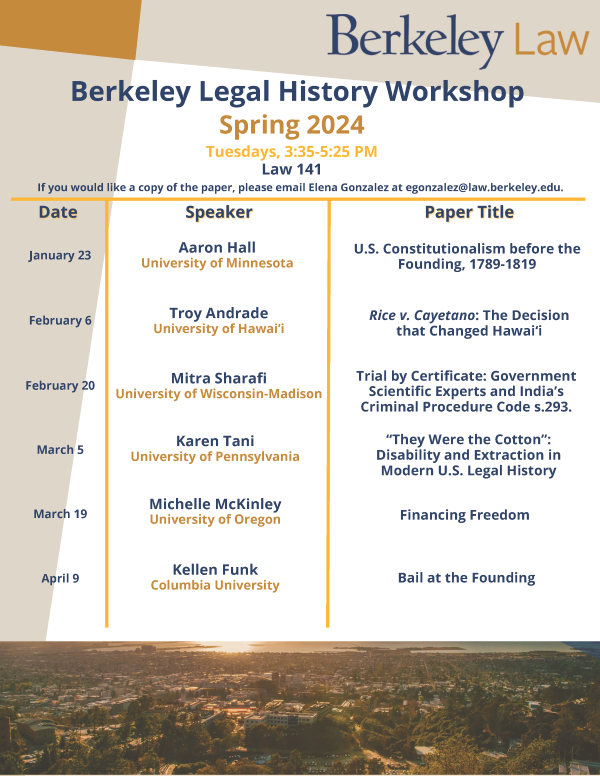- This event has passed.
Berkeley Legal History Workshop Welcomes Kellen Funk, Columbia
Tuesday, April 9, 2024 @ 3:35 pm - 5:25 pm
Event Navigation

Kellen R. Funk is a legal historian with expertise in civil procedure and remedies. He has written on the history of civil litigation practices in the United States, the development and reform of the American bail system, and the jurisprudence of churches and religious groups. Funk’s scholarship combines historical research methods with data science, including an original text analysis project mapping case law citations across all legal literature in the 19th-century United States. His co-authored study of the transmission of legal codes in Reconstruction America, published in the 2018 American Historical Review, has become a foundational work in the field of digital legal history.
Paper Title and Abstract
Bail at the Founding
ABSTRACT
How did criminal bail work in the Founding era? This question has become pressing as bail, and bail reform, have attracted increasing attention, in part because history is thought to bear on the meaning of bail-related provisions in state and federal constitutions. To date, however, there has been no thorough account of bail at the Founding. This Article begins to correct the deficit in our collective memory by describing bail law and practice in the Founding era, from approximately 1790 to 1810. In order to give a full account, we surveyed a wide range of materials, including Founding-era statutes, caselaw, legal treatises, and manuals for magistrates; and original court, jail, administrative, and justice-of-the-peace records held in archives and private collections.
The historical inquiry illuminates three key facts. First, the black-letter law of bail in the Founding era was highly protective of pretrial liberty. A uniquely American framework for bail guaranteed release, in theory, for nearly all accused persons. Second, things were different on the ground. The primary records reveal that, for those who lived on the margins of society, bail practice bore little resemblance to the law on the books, and pretrial detention was routine. The third key point cuts across the law and reality of criminal bail: both in theory and in practice, the bail system was a system of unsecured pledges, not cash deposits. It operated through reputational capital, not financial capital. This fact refutes the claim, frequently advanced by opponents of contemporary bail reform, that cash bail is a timeless American tradition. The contrast between the written ideals and the actual practice of bail in the Founding era, meanwhile, highlights the difficulty of looking to the past for a determinate guide to legal meaning.
Zoom Link (for those who wish to attend virtually)
Events are wheelchair accessible. For disability-related accommodations, contact the organizer of the event. Advance notice is kindly requested.
If you have any photos or video from your event that you’d like to share with Berkeley Law for possible use in our digital and print marketing, please email communications@law.berkeley.edu.
Interested in subscribing to a weekly email digest of Berkeley Law events? Learn more here.